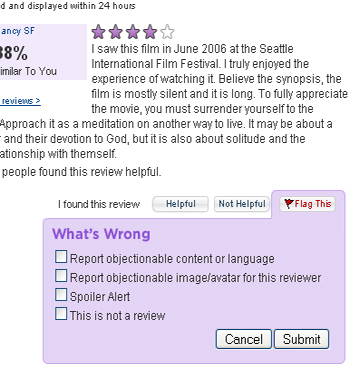What every movie review website needs
I can’t tell you how many times, even in notable magazines, I’ve read movie reviews that spoil the movie. It’s the most criminal, careless thing a critic can do: steal the narrative potency of someone else’s work. Even if it’s the worst movie in the world, a decent critic can tear it apart without spoiling the film.
So the other day on netflix I saw this – a spoiler warning:

On every review any user can flag reviews for spoilers.

Thank you Netflix.

I noticed spoiler warnings in Wikipedia movie articles as well.
The spoiler reviews are not always bad, sometimes they can save you from hours of torture.
Well, our reviews are all spoiler-free!
Fuck spoilers! Why bother reading a review anyway?
I’ve written 200 Movie Reviews for a book. Until I removed them, they were by far the very best on the internet.
I AM THE NUMBER ONE SPOILER! That’s my job as a Movie Reviewer.
For example, Eddie Murphy’s PLUTO NASH has a surprise villain. NOBODY on the internet mentioned who it is. I MENTIONED THAT EDDIE MURPHY PLAYS THE VILLAIN and I mentioned it in the first sentence of my review!
Repeat: If you don’t want so-called Spoilers, don’t read fucking Movie Reviews.
We try not to write spoilers, but occasionally they slip. Nothing big, but especially when writing about classic films, it’s hard not to mention things that are assumed to be common knowledge.
Really, what’s the point of a review if it does not tell you anything? Without relevant detail, it’s simply the subjective opinion of the critic (Reviewer). I would much rather know as much detail (Chain of events that create the story) of a film as possible. If after reading, I will then usually decide whether or not the film is worth viewing. It’s not a spoiler if someone describes a film, as the actual viewing of the film is required to fully understand the context of the story and how the chain of events are constructed in the manner in which the story is told.
My model for reviews is pulitzer winning reviewer Roger Ebert. He never spoils, and he does give relevant details. After I see a movie, I always check on the internet to see what his review was. After?
Yes, “after,” for a review is not a consumer’s report, is not merely a matter of reviewing the audience to see whether people liked the show.
When I was a university student reviewer, conscious that my fellow students were having “meaning of life” conversations in the dormitories, I was careful to consider the context of each movie. Not so much the context in “film history,” or the very-recent history of special effects, because I didn’t know film history, and I had little interest in lighting, props, stuntmen and special effects.
Rather, the context in terms of the liberal arts we were taking, of which Literature was only a part. The context of meaning and morality and society and citizenship. As comedian Red Green says, “I’m pulling for you, we’re all in this together.”